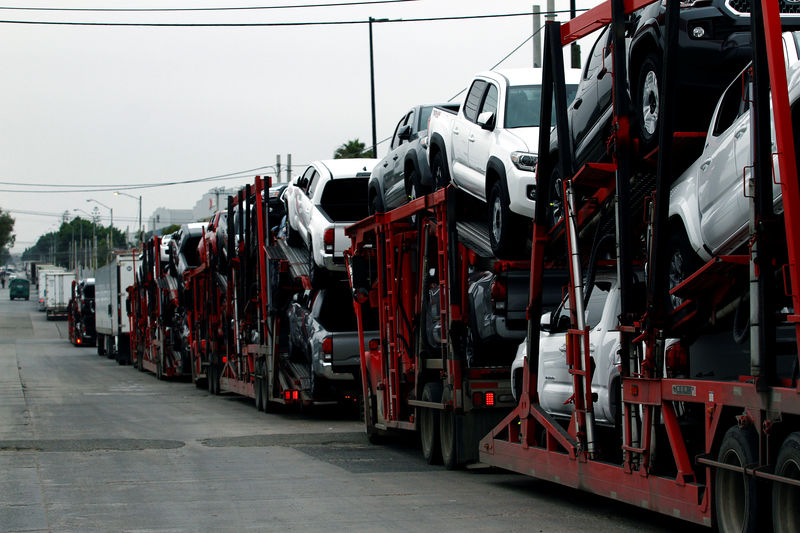By Naomi Tajitsu and Georgina Prodhan
TOKYO/MILAN (Reuters) - Shares of global automakers and suppliers tumbled on Friday after U.S. President Donald Trump threatened to impose tariffs on imports from Mexico, potentially upending a global manufacturing business model established decades ago.
From Mazda Motor Corp in Japan to Volkswagen (DE:VOWG_p) AG in Germany to General Motors Co (NYSE:GM) in the United States, carmaker stocks took a hit as a new front opened in the global trade war. Analysts estimated the proposed duties could cost automakers and suppliers as much as $23 billion, an amount that Deutsche Bank's Emmanuel Rosner said "could cripple the industry."
Automakers and suppliers could try to pass along tariff costs to consumers. Swedish industrial seals and bearings maker SKF, which supplies carmakers in the United States from Mexico, said it would pass on any tariff impact to customers..
"Margins are so thin in the U.S. market right now that there's no way that any automaker is not going to pass on these tariffs to their customers," said Janet Lewis, an analyst at Macquarie Securities.
However, other analysts said tough competition and slowing demand for vehicles would likely force manufacturers to eat much of the added cost. That in turn could force more cost-cutting by auto sector manufacturers.
Major trade groups that represent the Detroit Three automakers and global automakers with U.S. operations criticized the proposed tariffs in statements Friday.
"Any barrier to the flow of commerce across the U.S.-Mexico border will have a cascading effect – harming U.S. consumers, threatening American jobs and investment," David Schwietert, interim head of the Alliance of Automobile Manufacturers said in a statement that called tariffs a tax on consumers.
Auto trade groups also expressed concern that a tariff war with Mexico would undermine efforts to win congressional approval for a new U.S., Canada and Mexico trade agreement negotiated by the Trump administration.
Automakers shipped 2.52 million vehicles to the United States from Mexico in 2018, accounting for about 14.6% of total U.S. car and light truck sales, according to IHS Markit, a consulting and market research firm.
Railing against a surge of illegal immigrants across the U.S. southern border, Trump said he would target all goods coming from Mexico with a 5% tariff from June 10, increasing monthly to 25% by Oct. 1, unless Mexico took immediate action.
"In order not to pay Tariffs, if they start rising, companies will leave Mexico, which has taken 30% of our Auto Industry, and come back home to the USA," Trump wrote in a tweet on Friday.
Auto industry executives have said it would cost billions to abandon factories in Mexico and build replacements in the United States. For years carmakers and auto parts makers have built vehicles and parts in Mexico, taking advantage of its cheap labor, trade deals and proximity to the United States, the world's second largest auto market after China.
Mexico now dominates production of certain key automotive components, such as wiring harnesses - the networks of cables that connect on-board computers, brakes, headlights and other electrical systems. Mexico produces 97% of the wiring harnesses used in North American made vehicles, said Peter Nagle, senior automotive economist at IHS Markit.
Trump's threat to impose tariffs rattled a number of global companies and industries. In addition to the auto sector, aerospace suppliers, industrial component makers and electronics firms are vulnerable.
"This being escalated at a time when the China situation is not still resolved shows that Trump views tariffs as a weapon he can use without damage to the U.S. economy. That's worrying and sends a bad signal for the outlook for global trade overall," said Jon Harrison, a senior macro strategist at TS Lombard.
(graphic: https://tmsnrt.rs/2Khd82D)
TRADE FLOWS
The latest threat to impose tariffs on millions of vehicles bound for the United States comes two weeks after Trump announced he would delay a decision on imposing up to 25% tariffs on vehicles from the European Union and Japan by up to six months.
Automakers shipped $52.6 billion worth of vehicles to the United States from Mexican assembly plants in 2018. Another $32.5 billion in auto parts flowed to the U.S. from Mexican factories, according to U.S. Commerce Department data.
Some of the most popular vehicles sold in the United States are made in Mexico, including versions of GM's Chevrolet Silverado pickup, the Chevrolet Blazer SUV, Volkswagen's Jetta sedan and Toyota Motor Corp's Tacoma pickup.
SHARE IMPACT
Trump's tweet ignited a global sell-off in shares of major auto industry players. In Japan, where Trump's initial tweet threatening tariffs landed as markets were opening, shares in Toyota fell 3% while Nissan dropped 5% and Honda 4%. Mazda took a bigger hit, tumbling 7%. All four operate vehicle assembly plants in Mexico, producing roughly one-third of the vehicles made there.
In Europe, potential merger candidates Fiat Chrysler Automobiles NV and Renault SA (PA:RENA) led the carmakers lower, each falling 5%, while automotive supplier Faurecia SE was down 4% in late afternoon trading.

In Friday afternoon U.S. trading, shares of GM, Ford and big auto parts makers Delphi Technologies PLC, Aptiv PLC and seat maker Adient PLC all tumbled.